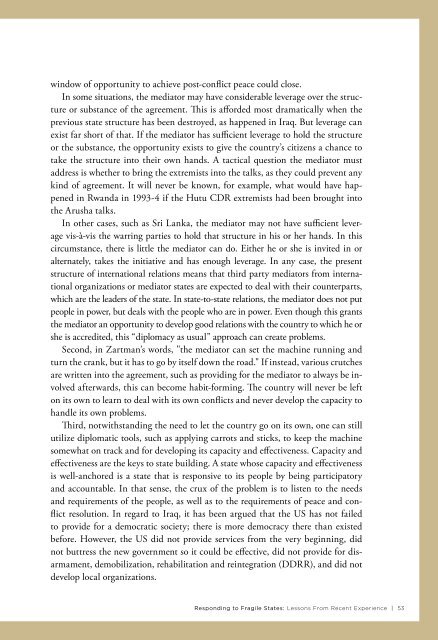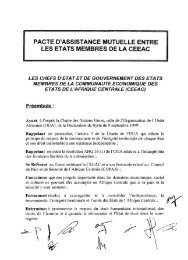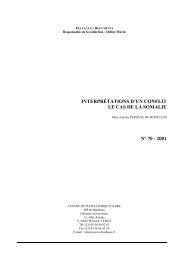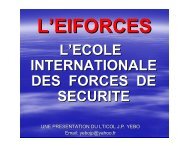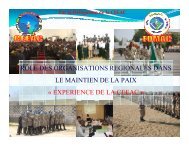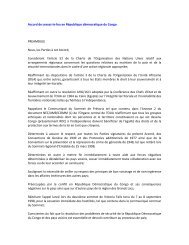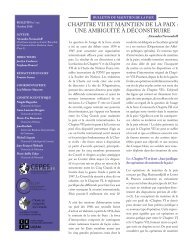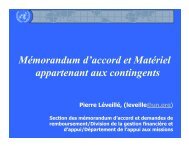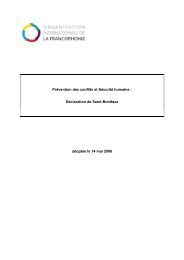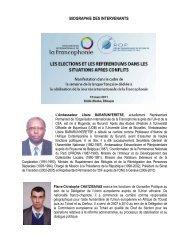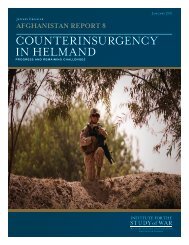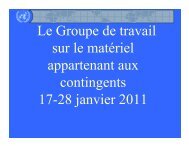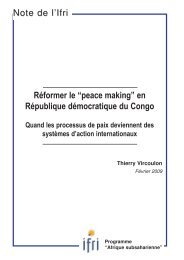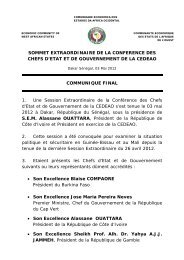engaging fragile states - Woodrow Wilson International Center for ...
engaging fragile states - Woodrow Wilson International Center for ...
engaging fragile states - Woodrow Wilson International Center for ...
Create successful ePaper yourself
Turn your PDF publications into a flip-book with our unique Google optimized e-Paper software.
window of opportunity to achieve post-conflict peace could close.<br />
In some situations, the mediator may have considerable leverage over the structure<br />
or substance of the agreement. This is af<strong>for</strong>ded most dramatically when the<br />
previous state structure has been destroyed, as happened in Iraq. But leverage can<br />
exist far short of that. If the mediator has sufficient leverage to hold the structure<br />
or the substance, the opportunity exists to give the country’s citizens a chance to<br />
take the structure into their own hands. A tactical question the mediator must<br />
address is whether to bring the extremists into the talks, as they could prevent any<br />
kind of agreement. It will never be known, <strong>for</strong> example, what would have happened<br />
in Rwanda in 1993-4 if the Hutu CDR extremists had been brought into<br />
the Arusha talks.<br />
In other cases, such as Sri Lanka, the mediator may not have sufficient leverage<br />
vis-à-vis the warring parties to hold that structure in his or her hands. In this<br />
circumstance, there is little the mediator can do. Either he or she is invited in or<br />
alternately, takes the initiative and has enough leverage. In any case, the present<br />
structure of international relations means that third party mediators from international<br />
organizations or mediator <strong>states</strong> are expected to deal with their counterparts,<br />
which are the leaders of the state. In state-to-state relations, the mediator does not put<br />
people in power, but deals with the people who are in power. Even though this grants<br />
the mediator an opportunity to develop good relations with the country to which he or<br />
she is accredited, this “diplomacy as usual” approach can create problems.<br />
Second, in Zartman’s words, "the mediator can set the machine running and<br />
turn the crank, but it has to go by itself down the road." If instead, various crutches<br />
are written into the agreement, such as providing <strong>for</strong> the mediator to always be involved<br />
afterwards, this can become habit-<strong>for</strong>ming. The country will never be left<br />
on its own to learn to deal with its own conflicts and never develop the capacity to<br />
handle its own problems.<br />
Third, notwithstanding the need to let the country go on its own, one can still<br />
utilize diplomatic tools, such as applying carrots and sticks, to keep the machine<br />
somewhat on track and <strong>for</strong> developing its capacity and effectiveness. Capacity and<br />
effectiveness are the keys to state building. A state whose capacity and effectiveness<br />
is well-anchored is a state that is responsive to its people by being participatory<br />
and accountable. In that sense, the crux of the problem is to listen to the needs<br />
and requirements of the people, as well as to the requirements of peace and conflict<br />
resolution. In regard to Iraq, it has been argued that the US has not failed<br />
to provide <strong>for</strong> a democratic society; there is more democracy there than existed<br />
be<strong>for</strong>e. However, the US did not provide services from the very beginning, did<br />
not buttress the new government so it could be effective, did not provide <strong>for</strong> disarmament,<br />
demobilization, rehabilitation and reintegration (DDRR), and did not<br />
develop local organizations.<br />
Responding to Fragile States: Lessons From Recent Experience | 53


